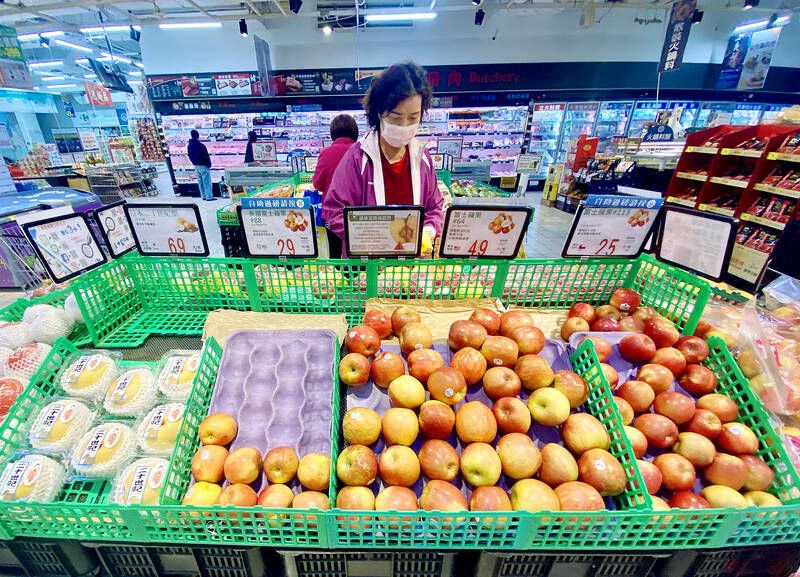The business climate monitor in December signaled “blue” for a second straight month, as exports, industrial output and other economic indicators contracted, while consumer spending gained traction, the National Development Council said yesterday.
The total score of nine monitoring indicators was unchanged at 12, reflecting a recession induced by global inflation and monetary tightening, council research director Wu Ming-huei (吳明蕙) said.
“Foreign trade, a key growth driver, would remain weak in the coming months, but might come out of the woods earlier as global inflationary pressures have showed signs of stabilizing,” Wu said.

Photo: CNA
The sub-index on retail, wholesale and dining revenue gained 1 point in December, but imports of electrical and machinery equipment retreated by the same pace, Wu said.
The council uses a five-color system to portray the nation’s economic health, with “green” signifying steady growth, “red” suggesting a boom and “blue” reflecting a recession. Dual colors suggest transition to a stronger or weaker state.
Rising inflation and interest rate hikes led consumers around the world to cut spending on technology gadgets, prompting major tech titans to shed headcount and manage inventory cautiously, the official said.
This might persist through the first half of this year, but a few steelmakers and electronics suppliers are expecting a turnaround next quarter, encouraged by China’s reopening and swift easing of COVID-19 restrictions.
The index of leading indicators, which projects the economic situation in the coming six months, weakened in December for the 13th straight month, albeit at a milder pace, Wu said, adding that the chance of a rebound is unlikely until the third quarter.
The index has declined 8.1 percent in the past 13 months, council data showed.
The index of coincident indicators, which reflects the current economic situation, shrank 2.08 percent to 92.06, as almost all constituent measures lost value except for the sub-index on non-farm payroll, the council said.
Service providers catering to domestic demand saw a rapid recovery in December, as companies held year-end banquets for employees, Wu said.
The momentum is expected to carry on into this month, as companies organize spring gatherings to celebrate the new year, he said.
In addition, demand for electronics used in high-performance computing, electric vehicles and emerging technology applications should thrive, while inventory corrections linger for smartphones and notebook computers, the council said.

SELL-OFF: Investors expect tariff-driven volatility as the local boarse reopens today, while analysts say government support and solid fundamentals would steady sentiment Local investors are bracing for a sharp market downturn today as the nation’s financial markets resume trading following a two-day closure for national holidays before the weekend, with sentiment rattled by US President Donald Trump’s sweeping tariff announcement. Trump’s unveiling of new “reciprocal tariffs” on Wednesday triggered a sell-off in global markets, with the FTSE Taiwan Index Futures — a benchmark for Taiwanese equities traded in Singapore — tumbling 9.2 percent over the past two sessions. Meanwhile, the American depositary receipts (ADRs) of Taiwan Semiconductor Manufacturing Co (TSMC, 台積電), the most heavily weighted stock on the TAIEX, plunged 13.8 percent in

A wave of stop-loss selling and panic selling hit Taiwan's stock market at its opening today, with the weighted index plunging 2,086 points — a drop of more than 9.7 percent — marking the largest intraday point and percentage loss on record. The index bottomed out at 19,212.02, while futures were locked limit-down, with more than 1,000 stocks hitting their daily drop limit. Three heavyweight stocks — Taiwan Semiconductor Manufacturing Co (TSMC, 台積電), Hon Hai Precision Industry Co (Foxconn, 鴻海精密) and MediaTek (聯發科) — hit their limit-down prices as soon as the market opened, falling to NT$848 (US$25.54), NT$138.5 and NT$1,295 respectively. TSMC's

TARIFFS: The global ‘panic atmosphere remains strong,’ and foreign investors have continued to sell their holdings since the start of the year, the Ministry of Finance said The government yesterday authorized the activation of its NT$500 billion (US$15.15 billion) National Stabilization Fund (NSF) to prop up the local stock market after two days of sharp falls in reaction to US President Donald Trump’s new import tariffs. The Ministry of Finance said in a statement after the market close that the steering committee of the fund had been given the go-ahead to intervene in the market to bolster Taiwanese shares in a time of crisis. The fund has been authorized to use its assets “to carry out market stabilization tasks as appropriate to maintain the stability of Taiwan’s

In a small town in Paraguay, a showdown is brewing between traditional producers of yerba mate, a bitter herbal tea popular across South America, and miners of a shinier treasure: gold. A rush for the precious metal is pitting mate growers and indigenous groups against the expanding operations of small-scale miners who, until recently, were their neighbors, not nemeses. “They [the miners] have destroyed everything... The canals, springs, swamps,” said Vidal Britez, president of the Yerba Mate Producers’ Association of the town of Paso Yobai, about 210km east of capital Asuncion. “You can see the pollution from the dead fish.